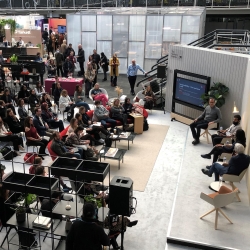To provide the best experiences, we use technologies like cookies to store and/or access device information. Consenting to these technologies will allow us to process data such as browsing behaviour or unique IDs on this site. Not consenting or withdrawing consent, may adversely affect certain features and functions.
The technical storage or access is strictly necessary for the legitimate purpose of enabling the use of a specific service explicitly requested by the subscriber or user, or for the sole purpose of carrying out the transmission of a communication over an electronic communications network.
The technical storage or access is necessary for the legitimate purpose of storing preferences that are not requested by the subscriber or user.
The technical storage or access that is used exclusively for statistical purposes.
The technical storage or access that is used exclusively for anonymous statistical purposes. Without a subpoena, voluntary compliance on the part of your Internet Service Provider, or additional records from a third party, information stored or retrieved for this purpose alone cannot usually be used to identify you.
The technical storage or access is required to create user profiles to send advertising, or to track the user on a website or across several websites for similar marketing purposes.
 In just a few days the eagerly-awaited Workspace Design Show, the trade show that brings together the UK workplace interiors community, will open its doors. Held at London’s Business Design Centre, handily placed in the heart of Islington, from 27-28 February 2024, the event offers attendees the chance to explore the latest industry trends, see the latest products, and find inspiration in the thought-provoking talks programmes. More →
In just a few days the eagerly-awaited Workspace Design Show, the trade show that brings together the UK workplace interiors community, will open its doors. Held at London’s Business Design Centre, handily placed in the heart of Islington, from 27-28 February 2024, the event offers attendees the chance to explore the latest industry trends, see the latest products, and find inspiration in the thought-provoking talks programmes. More →




















 The amount of unpaid overtime that workers around the world are doing has soared in the past year; unpaid overtime in the UK has steadily risen from six hours in 2019 to seven hours in 2020 in the advent of COVID-19, to almost eight hours in 2021, claims a new study by the
The amount of unpaid overtime that workers around the world are doing has soared in the past year; unpaid overtime in the UK has steadily risen from six hours in 2019 to seven hours in 2020 in the advent of COVID-19, to almost eight hours in 2021, claims a new study by the 
 There are some good things about working in an office. Constant supplies of tea and coffee (if you’re lucky), gossip with your co-workers, and paper clips in every colour. But one of the best things has to be that when something goes wrong with your computer, the in-house IT helpdesk will have it sorted out quicker than you can say ‘so which buttons do you want me to press?!’ However, home workers don’t have this luxury.
There are some good things about working in an office. Constant supplies of tea and coffee (if you’re lucky), gossip with your co-workers, and paper clips in every colour. But one of the best things has to be that when something goes wrong with your computer, the in-house IT helpdesk will have it sorted out quicker than you can say ‘so which buttons do you want me to press?!’ However, home workers don’t have this luxury. 
 New research by
New research by 









July 17, 2020
Your working day is never finished, merely abandoned
by Mark Eltringham • Comment, Flexible working, Technology